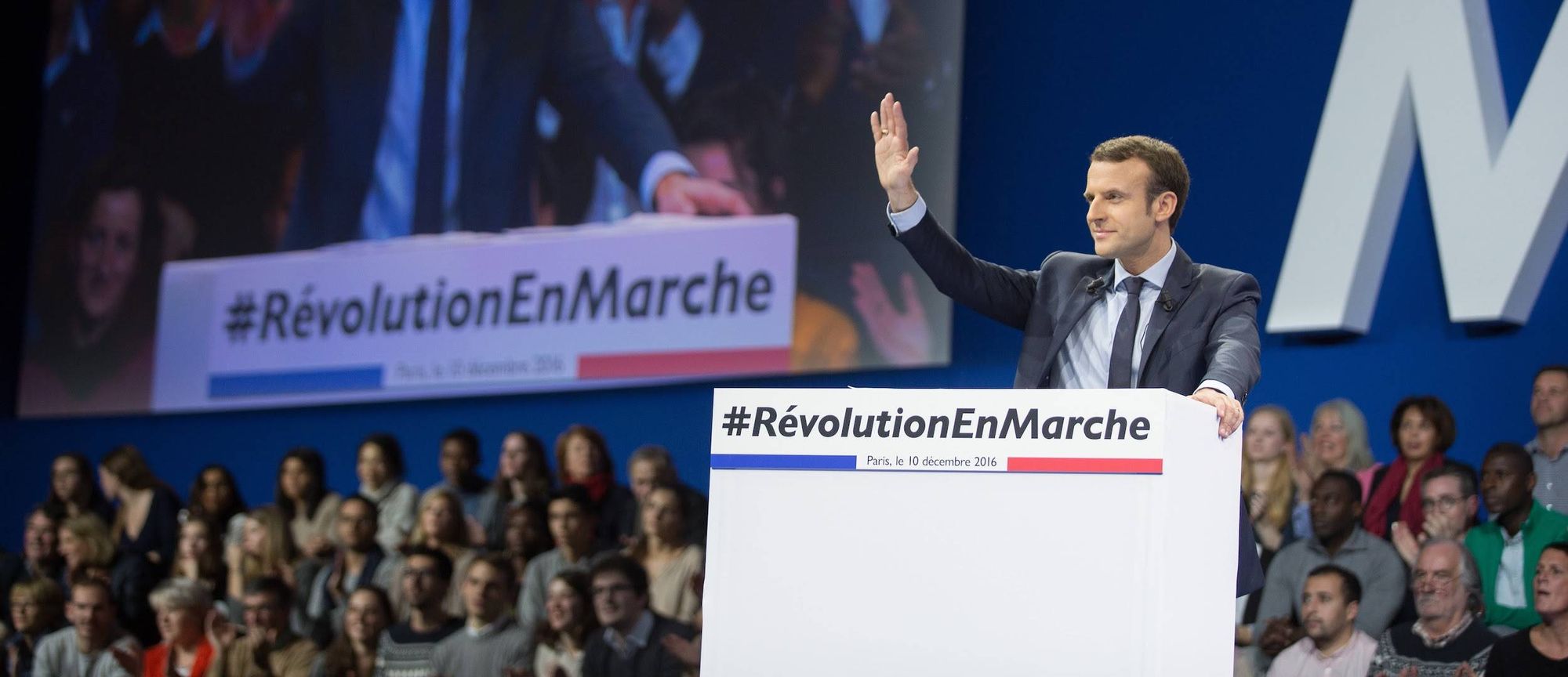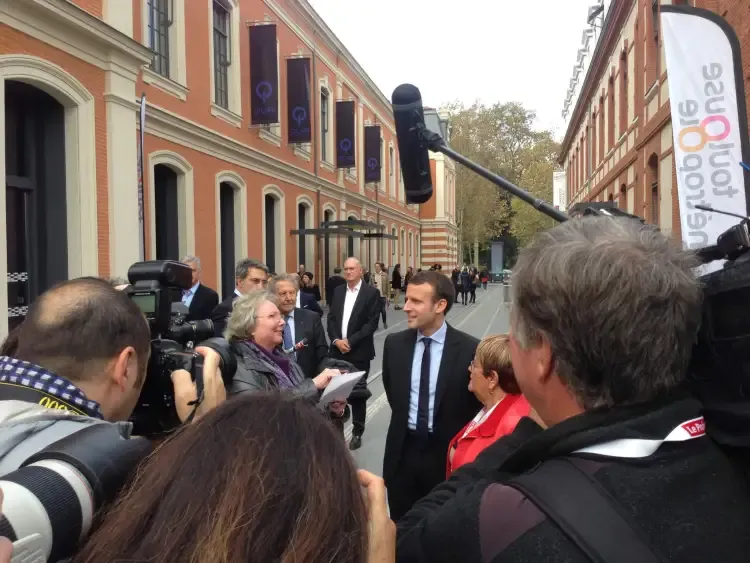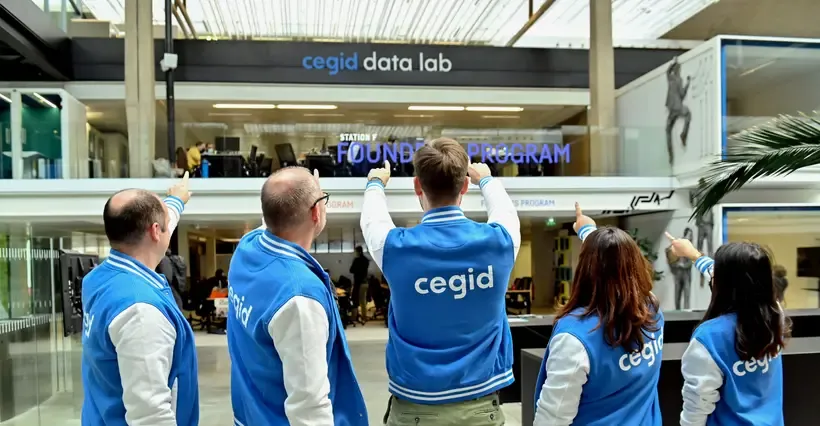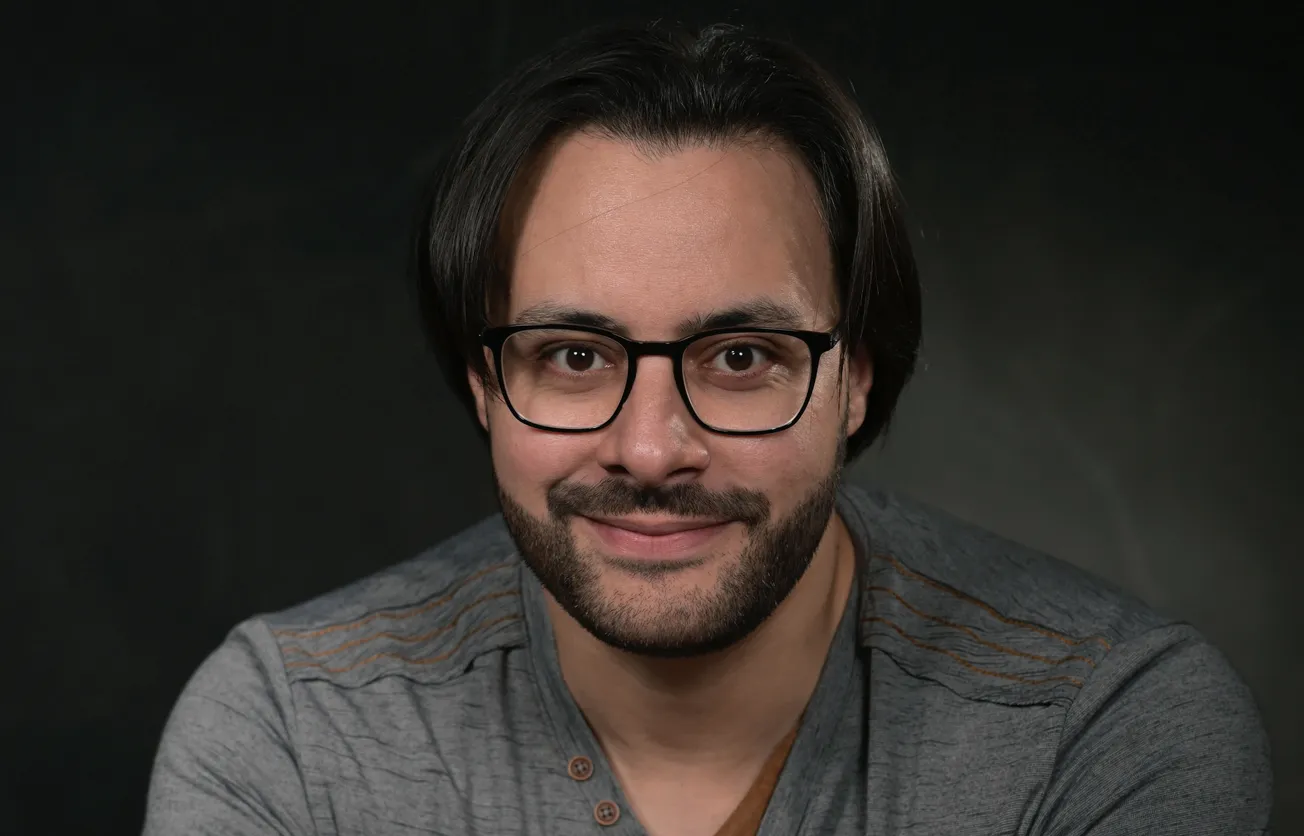The following is an excerpt from a book project about life in modern France. I'm cross-posting this section from a 6-part series I'm sharing at French Crossroads about my various encounters with Emmanuel Macron and his 2017 campaign for president. Most of this is based on stories for VentureBeat and the Los Angeles Times.
Some of the writing has been recycled elsewhere, so you may recognize snippets. But with the first round of the French elections approaching this Sunday, it felt like a good time to look back at the last campaign that transformed Macron from an obscure figure to an unlikely president who continues to confound the French.
Part I is here: A Fresh French Face At LeWeb.
At a meeting with locals in his hometown of Amiens on April 6, 2016, Macron announced the creation of En Marche! The phrase could be loosely translated as “On the move” and included an exuberant, Yahoo!-style exclamation mark. Like so much else surrounding him, En Marche! was a puzzlement to the established French order. Macron, who had been called a few months earlier a “UFO in politics” by Le Monde, told the press and residents gathered that day that he wanted to create a movement that was neither right nor left.
It was something he formed after much reflection because he wanted to “build something else” to “move forward” against the “blockages of society.” He had already revealed he was not an official member of the Socialist Party, despite being Hollande’s minister. En Marche! would be open to anyone who was still a member of another party. A video on the En Marche! website that launched that day lamented a country made weak because it was blocked by too much traditional thinking. “We will not make the France of tomorrow without making way for new ideas,” the video proclaimed.
But, what would En Marche!, do? That was a bit fuzzier. Macron said it was most definitely not a new political party. And he insisted that this was not an opening gambit toward a run for the presidency. "It's not a movement to have another candidate for the presidential election,” Macron said. “That is not my priority today. My priority is the country’s situation.”
Nobody believed him.
Hollande was displeased, and other ministers denounced him and viewed En Marche! as a betrayal. But if En Marche! at the time seemed like a vague concept, the steps Macron had taken to create it revealed a tremendous amount about him, his ideas, and his methodology.
At its heart, En Marche! was a startup. Macron was the product it would sell.
Silicon Valley Dreaming
The conception of En Marche! combined two things that Macron deeply admired: Silicon Valley and Barack Obama. Before becoming Economic Minister, Macron had quit Hollande’s government for several weeks over the summer of 2014. He spent those weeks in Silicon Valley meeting tech CEOs, entrepreneurs, and investors. From the start, Macron had been a supporter of the French Tech program to boost entrepreneurship, traveling with the massive delegation of startups that France sends each January to the gargantuan Consumer Electronics Show in Las Vegas.

Following the 2016 CES, he visited San Francisco to meet French entrepreneurs and then stopped for meetings at Apple and Google. “There is a cultural revolution in progress, that of the entrepreneurial force in France that the country needs,” he told French entrepreneurs in San Francisco. He said he wanted to change the culture in France, where there is a great fear of failing, but also a suspicion of people who want to be too successful: “That leaves little room to maneuver.” (His trips to CES would later lead to one of the first scandals of his new government. The issue: Whether his attendance at a CES party organized by a French business association constituted a campaign appearance. It was a contretemps in France that seemed mystifying to an American.)
On the political side, Macron believed there was a center in France that was not being represented by the traditional left-right parties. To define that center and help him build a new political movement from scratch, Macron turned to Liegey Muller Pons, a Paris firm that billed itself as “Europe’s first campaign startup.” The firm was founded by three young Parisians who met in the United States while volunteering for Obama’s campaign in 2008.
Impressed by the way Obama’s team leveraged deep data analysis to attract, organize, and motivate an army of volunteers, the firm began adapting those tactics for a country where politics and rules around privacy and data are very different. “We don’t do digital consulting for how to use Facebook or Twitter,” Guillaume Liegey, a firm co-founder, told me. “We don’t do fundraising. What we really focus on is the large-scale coordination of people on the ground. We like to describe what we do as combining data, digital, and human.”
Well before his official break with the Hollande government, Macron had been talking informally with Liegey. The two had met years earlier when Liegey was working as a consultant for McKinsey. Liegey had left to study at Harvard University in 2007 when he got swept up in the excitement of the Obama campaign and decided to volunteer. While knocking on doors in New Hampshire, Liegey was amazed at the sophistication of data volunteers were given each day in terms of which doors to knock on, which routes to walk, and the profiles of people they were targeting.
The experience also convinced him just how powerful face-to-face conversations with voters could be. “There’s now been a lot of experiments organized that show that the more direct the contact with a voter, the more likely they are to show up at the polls or change their minds,” he said. Liegey met two other French students in Boston during that time: Arthur Muller and Vincent Pons, who also volunteered for Obama. After moving back to Paris, the trio eventually approached the then-nascent campaign of Hollande in 2012. They suggested they could modernize his campaign efforts by creating a more elaborate get-out-the-vote effort by enlisting more volunteers, something at the time that wasn’t a standard part of the political playbook for campaigns.
The trio operated on a volunteer basis for Hollande and the Socialist Party. Eventually, they were given a small budget and grew their team to about 15 volunteers. They developed software in-house that drew heavily on the data from the party’s dues-paying membership list of about 150,000 members at the time. These party activists were connected with volunteers to go door-to-door across the country. “The technology really helped us scale the size of the campaign,” Liegey said. The result: Over the course of the campaign in 2012, they amassed around 40,000 volunteers who knocked on 5 million doors. Hollande narrowly won with 51.7 percent. “If you look at campaigning in France, they don’t ask anymore if they should do this type of campaigning,” Liegey said. “They just do it.”
Following the Hollande campaign, the three friends officially created Liegey Muller Pons. Liegey stayed in touch with Macron as he joined the French government. Early in 2016, Macron officially hired the firm to help him flesh out his concept for a new political movement.
At the start, the new team had almost no data. Under French privacy laws, people can’t just go down and get copies of voting record databases or buy third-party databases from market researchers or other politicians to send political messages as is standard in the U.S. Instead, the group needed people to voluntarily give them their personal information and to do it on a scale that allowed for meaningful insights. That challenge was even greater given that initially, the project was being conducted under the radar. “There was no database,” Liegey said. “It was prepared in secret. They didn’t want leaks.”
After Macron went public with En Marche!, he said the new movement would start with a Grande Marche. That is, a process to have conversations with citizens across the country and use their input to create a platform for the new movement. The group launched a website and invited volunteers to register. Within a few weeks, the site attracted 30,000 registrations. The En Marche! team started using that data to enlist volunteers who would go out into neighborhoods, knock on doors, and conduct interviews. Liegey said they were hoping to get 6,000 volunteers but only got 5,000. Initially, he was disappointed, but in retrospect, he felt good about the conversion rate of volunteers for such a new effort.
Those volunteers were given some basic training in interview techniques and managing other volunteers. Initially, the team tried to develop a voice app for volunteers to record interviews, but it proved to be too difficult to capture good sound in the field, and then it would require transcription. Instead, they developed an app that allowed the team to write keyword answers to a handful of general questions: What works in France? What doesn’t work in France? (Top two answers: education system and politics) If you were to say one word about politics in France, what would it be? Tell us about the best/worst experience you had in the past year? (The wave of terrorist attacks over the past two years was by far the largest response for “worst.”) Can you tell us about a very concrete local initiative around you?
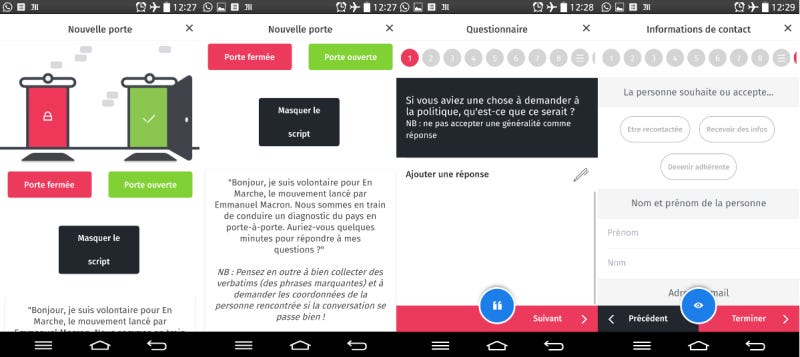
The team took the new data it had accumulated and these interviews and merged it with aggregate demographic data to create a more sophisticated view of the French electorate. It still didn’t allow the precision available to politicians in the U.S., but they felt they were operating on a more sophisticated level than other French political parties.
For several weeks in the spring and summer of 2016, En Marche! volunteers knocked on doors to gather even more data. Just as important, the idea was to create a culture within En Marche! that was more engaged, to have an impact on the volunteers as much as to attract interest from potential voters. They wanted En Marche! members to interact with more than just other En Marche! volunteers. “We want to force our members to go out of their inner circle and their neighborhoods and engage with different people,” Liegey said. “We want to use that to understand what is at stake in the country right now. But we also want to send a message that we are here to listen.”
Over a three-month period, En Marche’s 5,000 volunteers knocked on 300,000 doors, spoke to 100,000 people, and filled out 25,000 questionnaires. The next step was to hand all this data over to Paris-based Proxem, a startup that does semantic analysis of text. Proxem used algorithms to sort the responses to not just rank which were the most popular, but to determine the sentiment of responses (i.e., did the respondent feel strongly or not?).
In August, Macron officially resigned from the government to focus on En Marche!. Data analysis in hand, Macron held three town halls across France in October to deliver what he called the “diagnostic.” The meetings lasted two to three hours and were live-streamed and had the feel at times of revival meetings. Before Macron spoke, presenters gave fairly detailed explanations of how this process worked that included a 40-page explanatory document and results from Proxem in the form of a 176-page analysis.
According to the results, the two biggest themes that emerged were “family” and “social protection.” The most important values: solidarity and integrity. Conveniently, the analysis detected a strong desire to see a renewal in France’s political life. “The French appear to be suffering, because they feel they no longer control their own destiny, and that our democratic system is closed to them,” Macron said at one diagnostic. “This is not only a French malaise but a malaise we find everywhere in Europe because we have a world that is changing brutally.”
Following a whirlwind of publicity from the town halls, Macron declared on November 16 that he would be a candidate for president in the May 2017 elections. He announced his candidacy in a livestream on Facebook, but also with a Medium blog post. “I am convinced that our country has the strength and the desire to move forward because it has the history and the people for it,” he wrote. “But France today has left the path of progress.”
While it was unclear how much of the nation was following all of this, his campaign had clearly captured the imagination of many young people and entrepreneurs in France who had embraced change as a core principle of their lives. People like Axelle Tessandier.
Entrepreneurs Engaged
Tessandier’s decision to leave France in 2009 was as obvious for her as was the decision to return in 2016. In both cases, Tessandier, born in 1981, felt the desire to be part of something new and exciting. In both cases, there was something in her gut telling her to just go. “I was a bit looking for myself,” she recalled thinking in 2009. “I felt a bit stuck in Paris.”
She was accepted into a digital arts residency in Berlin for a program sponsored by T-Mobile and Google. After a couple of months, she was selected to travel to San Francisco to continue work on a project. She eventually was hired to be marketing director for Scoop.it, working for another French entrepreneur in San Francisco. “I was supposed to stay only four months in San Francisco,” she said. “I stayed 6 years.” In San Francisco, she felt at home in a way she hadn’t felt in a long time. “I was a geek, a yogini, and a vegetarian,” Tessandier said. “I arrived in San Francisco, it was like, ‘Wow, it’s a dream.’ It felt like I was going to change the world every day. It’s a very optimistic place. When you arrive from France, trust me, it’s a shock.”
The halo that shines around Silicon Valley from a distance has a way of dimming when you spend enough time in its frenzied tech scene. A new boom was underway in Silicon Valley as seemingly unlimited venture capital was once again flowing down the streets, giving rise to companies like Uber. The money was so easy, and the startups so many, Tessandier eventually began to worry something was being lost. “When I arrived in Silicon Valley, I learned that the currency is not money, it’s ideas,” she said. “But at the end, I was wondering, is that still the case?”
She returned to Paris briefly in 2015 to help crowdfunding platform Kickstarter launch in the country and found herself being drawn back to France. “When I was in Silicon Valley, everything was work, work, work,” she said. “But when I’m in Paris, I could talk about movies and culture. Silicon Valley started to be very monocultural.” Eventually, she concluded: “On a personal level, I felt I did my time there. I felt like it was the end of a cycle and I felt that I had learned many things in Silicon Valley that could be useful here. And I saw that many of my clients were French.”
At the same time, her visits to Paris had revealed a new vibrancy and entrepreneurial spirit that wasn’t there back when she left in 2009. By April 2016, she had returned to Paris full-time and launched the Axl Agency to work with big and small companies, talking to them about transparency and managing innovation inside their organizations. With her time and network in Silicon Valley, she believed she had something vital to offer. France seemed ready to change, and she wanted to be on the front lines. “When I was 20 years old, people I knew were dreaming about moving to London and working at Goldman Sachs,” she said. “Now these people are at Startup Weekend.”
Fresh from her San Francisco adventure and trying to re-establish herself in Paris, Tessandier was soon drawn to Macron’s message.
As she settled back into Paris, she was invited to moderate a debate by a group of Macron supporters. Tessandier caught the eye of En Marche’s leadership, who then asked her to participate in a more official event over the summer. As she learned more about Macron and En Marche, she found herself thinking it was the beginning of something remarkable. “Sometimes the criticisms are really targeted toward Macron,” she said. “But they forget how new it is to have a movement that takes three months to go meet thousands of people and talk to them and to listen to them. What other political group has done this kind of open process from the beginning? They created a new movement in a very, very closed system. And suddenly, you have a 39-old innovator running for president.”
Following the diagnostics, Tessandier was named one of the 11 official ambassadors of En Marche!. She wasn’t worried about the verdicts of pundits who seemed to think Macron’s efforts were quixotic, noting that predictions across the board have been way off the past political year. She said the inspiration and optimism she and others felt from Macron were real. “I want us to be the passion vote,” she said. “I want us to be the conviction vote. I want to talk about what kind of society we want to create.”
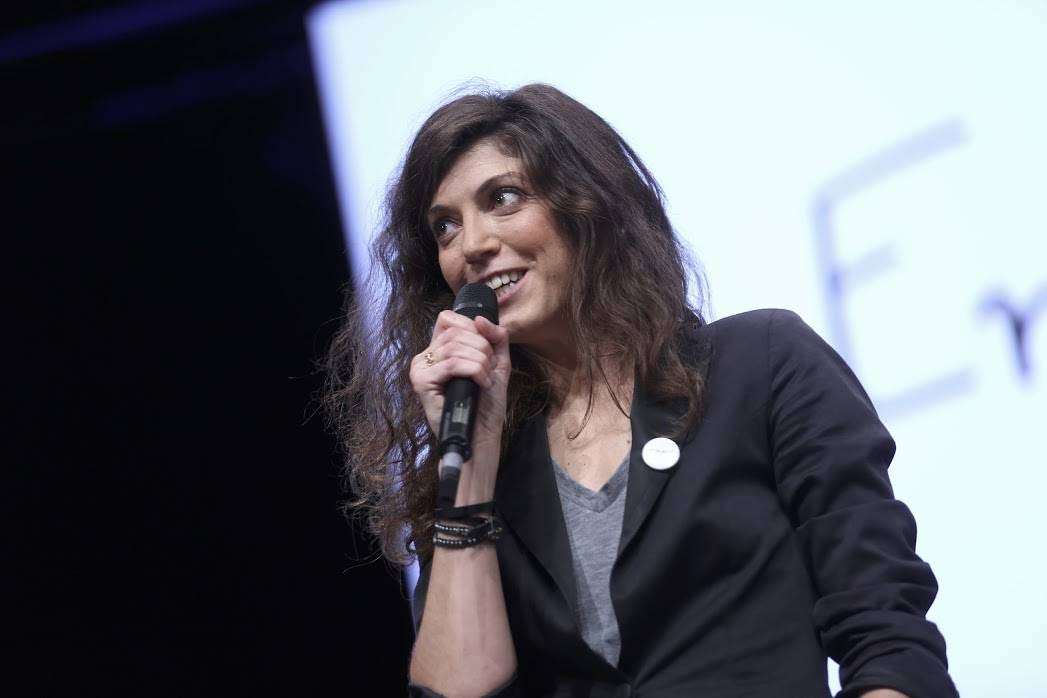
The Candidate
Meanwhile, Macron had been on the move non-stop. The textual analysis from the Grande Marche continued to be mined for keywords Macron used in his speeches and to adapt them as he visited different regions and different audiences. And they were providing a wealth of anecdotes about real people and their challenges. "If you look at Macron, he likes the American way of campaigning," said Liegey. "He's very interested in this American way of telling stories with concrete examples. Rather than the French style of just coming from the brain, he wants to talk about values and speak from the heart."
Macron’s and En Marche!’s platform continued to evolve as he made investments in technology and innovation a key part of his campaign. What wasn’t necessarily clear to pundits sitting in studios in Paris was the impact En Marche!’s strategy was having on the ground.
By late fall 2016 when Macron announced his candidacy, En Marche! had 120,000 members registered who had formed 3,000 local committees and were holding on average 400 events each week. At an En Marche! rally in Paris held in early December, he drew a surprising 15,000 attendees whose enthusiasm was unmistakable.
“The digital revolution is going to destroy some things, and at the same time, it creates opportunity,” Macron said in November during a visit to Toulouse. He was speaking at a business innovation conference just down the street from my apartment. And already the mobs of supporters and the curious were starting to swell. “It’s important to protect the individual, but also that society accepts risk and the failures,” he said. “This is a time of revolution for everything, and that includes politics.”
